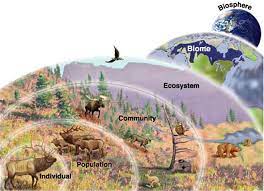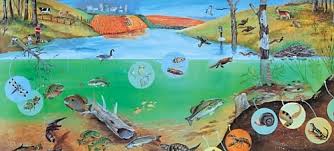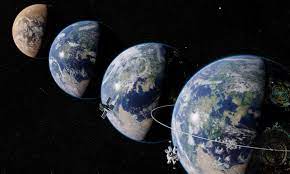Basics and Levels of Organization of Ecology
Ecology is the scientific study of the inter-relationship of living organisms – plants, animals and microbes with each other and with their physical environment. It mainly concerns with the directive influences of abiotic and biotic environmental factors over the growth, distribution, behaviour and survival of organisms.
In other words, ecology is the science which investigates organisms in relation to their environment and a philosophy in which the world of life is interpreted in terms of natural processes.
The term Environment, which etymologically means surroundings, is considered as a composite term for the conditions in which organisms live and, thus, consists of air, water, food and sunlight which are the basic needs of all living beings and plant life, to carry on their life functions.
The environment also includes other living things, temperature, wind, electricity etc. In other words, environment consists of both biotic and abiotic substances. Environment creates favourable conditions for the existence and development of living organisms.
The term organism refers to an individual unit constituted to carry on the activities of life. It is a dynamic biological unit which is greatly influenced by an enveloping and fluctuation environment.
For a given organism, the environment includes all the surrounding physical and biological factors with which it interacts. The factor is any external force, substance, or condition that affects organisms in anyway.
Thus, environment is the sum total of everything that directly influences the animal‘s chances of survival and reproduction.
Levels of Organization of Ecology
Ecologists study nature on different levels, from a local to a global scale. These levels, reveal the complex relationships found in nature.
Organism: An organism is an individual living thing, such as an alligator.
Population: A population is a group of the same species that lives in one area, such as all the alligators that live in a swamp.
Community: A community is a group of different species that live together in one area, such as groups of alligators, turtles, birds, fish, and plants that live together in the Florida Everglades.
Ecosystem: An ecosystem includes all of the organisms as well as the climate, soil, water, rocks, and other nonliving things in a given area. Ecosystems can vary in size. An entire ecosystem may live within a decaying log, which in turn may be part of a larger wetland ecosystem.
Biome: A biome is a major regional or global community of organisms. Biomes are usually characterized by the climate conditions and plant communities that thrive there.

Ecologists study relationships within each level of organization and also between levels. For example, researchers may study the relationshipswithin a population of alligators, as well as the relationships between alligators and turtles in a community.
Biotic and Abiotic Factors
An ecosystem includes both biotic and abiotic factors.
All ecosystems are made up of living and nonliving components. These parts are referred to as biotic and abiotic factors.
Biotic factors are living things, such as plants, animals, fungi, and bacteria. Each organism plays a particular role in the ecosystem. For example, earthworms play a key role in enriching the soil.
Read Also : Soil Conservation: Meaning, Categories and Soil Management Practices
Abiotic factors are nonliving things such as moisture, temperature, wind, sunlight, and soil. The balance of these factors determines which living things can survive in a particular environment.
In the Caribbean Sea, scientists found that coral reefs located near saltwater marshes have more fish than do reefs farther out at sea. As shown in figure 2.1, the key biotic factor is the mangrove trees that live in the marshes.
The trees provide food and shelter for newly hatched fish, protecting them from predators. After the fish mature, they swim to the reefs. Abiotic factors that affect the growth of mangrove trees include low levels of oxygen in the mud where they grow and changing levels of salinity, or saltiness, due to daily tidal changes.
An ecosystem may look similar from one year to the next, with similar numbers of animals and plants. However, an ecosystem is always undergoing some changes. For example, a long period of increased precipitation might allow one plant species to grow better than others. As the plant continues to grow, it may crowd out other plant species, changing the community‘s composition.
Though the total number of plants in the community may remain the same, the species have changed. As these cyclic changes occur, an ecosystem falls into a balance, which is known as approximate equilibrium.
In summary, ecology is the scientific study of the inter-relationship of living organisms – plants, animals and microbes with each other and with their physical environment.
It mainly concerns with the directive influences of abiotic and biotic environmental factors over the growth, distribution, behaviour and survival of organisms.
In other words, ecology is the science which investigates organisms in relation to their environment and a philosophy in which the world of life is interpreted in terms of natural processes.


